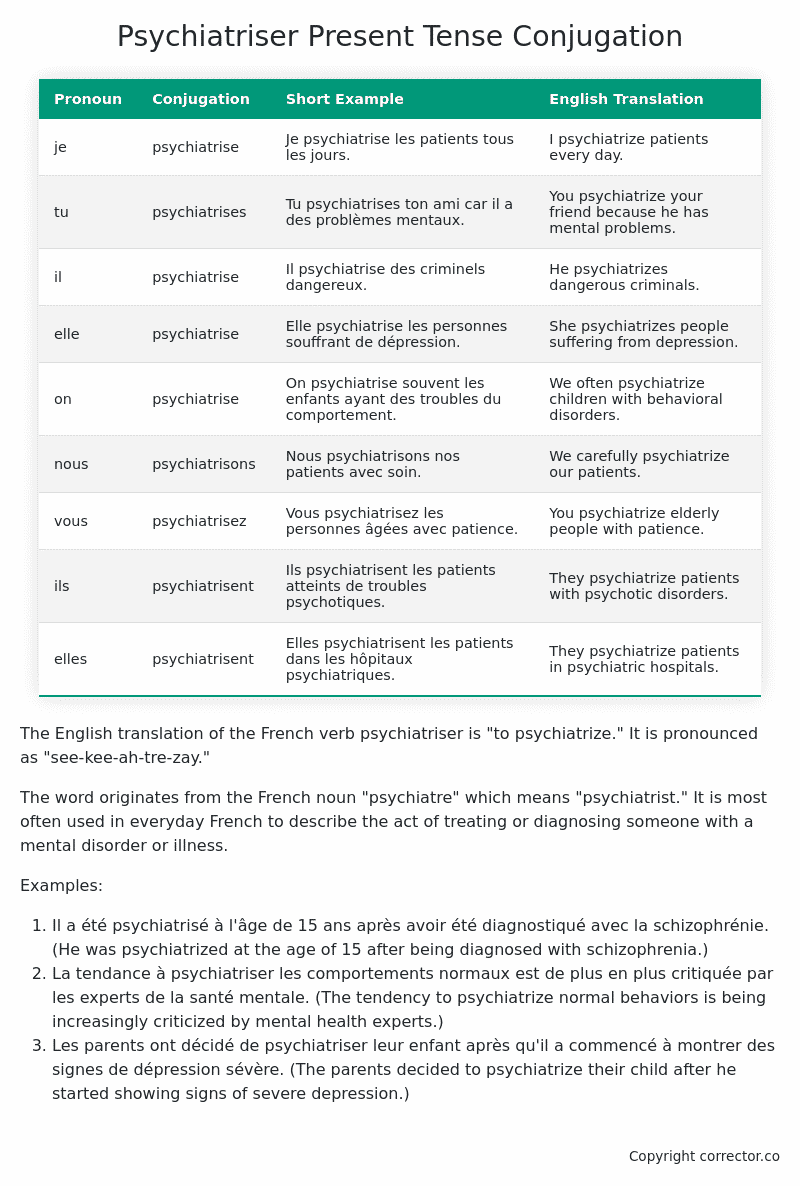Le Present (Present Tense) Conjugation of the French Verb psychiatriser
Introduction to the verb psychiatriser
The English translation of the French verb psychiatriser is “to psychiatrize.” It is pronounced as “see-kee-ah-tre-zay.”
The word originates from the French noun “psychiatre” which means “psychiatrist.” It is most often used in everyday French to describe the act of treating or diagnosing someone with a mental disorder or illness.
Examples:
- Il a été psychiatrisé à l’âge de 15 ans après avoir été diagnostiqué avec la schizophrénie. (He was psychiatrized at the age of 15 after being diagnosed with schizophrenia.)
- La tendance à psychiatriser les comportements normaux est de plus en plus critiquée par les experts de la santé mentale. (The tendency to psychiatrize normal behaviors is being increasingly criticized by mental health experts.)
- Les parents ont décidé de psychiatriser leur enfant après qu’il a commencé à montrer des signes de dépression sévère. (The parents decided to psychiatrize their child after he started showing signs of severe depression.)
Psychiatriser – About the French Present Tense
To take a deep dive into all the French tenses then see our article on Mastering French Tense Conjugation.
Common Everyday Usage Patterns For Le Present
Interactions with Other Tenses
Table of the Present Tense Conjugation of psychiatriser
| Pronoun | Conjugation | Short Example | English Translation |
|---|---|---|---|
| je | psychiatrise | Je psychiatrise les patients tous les jours. | I psychiatrize patients every day. |
| tu | psychiatrises | Tu psychiatrises ton ami car il a des problèmes mentaux. | You psychiatrize your friend because he has mental problems. |
| il | psychiatrise | Il psychiatrise des criminels dangereux. | He psychiatrizes dangerous criminals. |
| elle | psychiatrise | Elle psychiatrise les personnes souffrant de dépression. | She psychiatrizes people suffering from depression. |
| on | psychiatrise | On psychiatrise souvent les enfants ayant des troubles du comportement. | We often psychiatrize children with behavioral disorders. |
| nous | psychiatrisons | Nous psychiatrisons nos patients avec soin. | We carefully psychiatrize our patients. |
| vous | psychiatrisez | Vous psychiatrisez les personnes âgées avec patience. | You psychiatrize elderly people with patience. |
| ils | psychiatrisent | Ils psychiatrisent les patients atteints de troubles psychotiques. | They psychiatrize patients with psychotic disorders. |
| elles | psychiatrisent | Elles psychiatrisent les patients dans les hôpitaux psychiatriques. | They psychiatrize patients in psychiatric hospitals. |
Other Conjugations for Psychiatriser.
Le Present (Present Tense) Conjugation of the French Verb psychiatriser (this article)
Imparfait (Imperfect) Tense Conjugation of the French Verb psychiatriser
Passé Simple (Simple Past) Tense Conjugation of the French Verb psychiatriser
Passé Composé (Present Perfect) Tense Conjugation of the French Verb psychiatriser
Futur Simple (Simple Future) Tense Conjugation of the French Verb psychiatriser
Futur Proche (Near Future) Tense Conjugation of the French Verb psychiatriser
Plus-que-parfait (Pluperfect) Tense Conjugation of the French Verb psychiatriser
Passé Antérieur (Past Anterior) Tense Conjugation of the French Verb psychiatriser
Futur Antérieur (Future Anterior) Tense Conjugation of the French Verb psychiatriser
Subjonctif Présent (Subjunctive Present) Tense Conjugation of the French Verb psychiatriser
Subjonctif Passé (Subjunctive Past) Tense Conjugation of the French Verb psychiatriser
Subjonctif Imparfait (Subjunctive Imperfect) Tense Conjugation of the French Verb psychiatriser
Conditionnel Présent (Conditional Present) Tense Conjugation of the French Verb psychiatriser
Conditionnel Passé (Conditional Past) Tense Conjugation of the French Verb psychiatriser
L’impératif Présent (Imperative Present) Tense Conjugation of the French Verb psychiatriser
L’infinitif Présent (Infinitive Present) Tense Conjugation of the French Verb psychiatriser
Struggling with French verbs or the language in general? Why not use our free French Grammar Checker – no registration required!
Get a FREE Download Study Sheet of this Conjugation 🔥
Simply right click the image below, click “save image” and get your free reference for the psychiatriser Present Tense tense conjugation!

I hope you enjoyed this article on the verb psychiatriser. Still in a learning mood? Check out another TOTALLY random French verb present conjugation!


